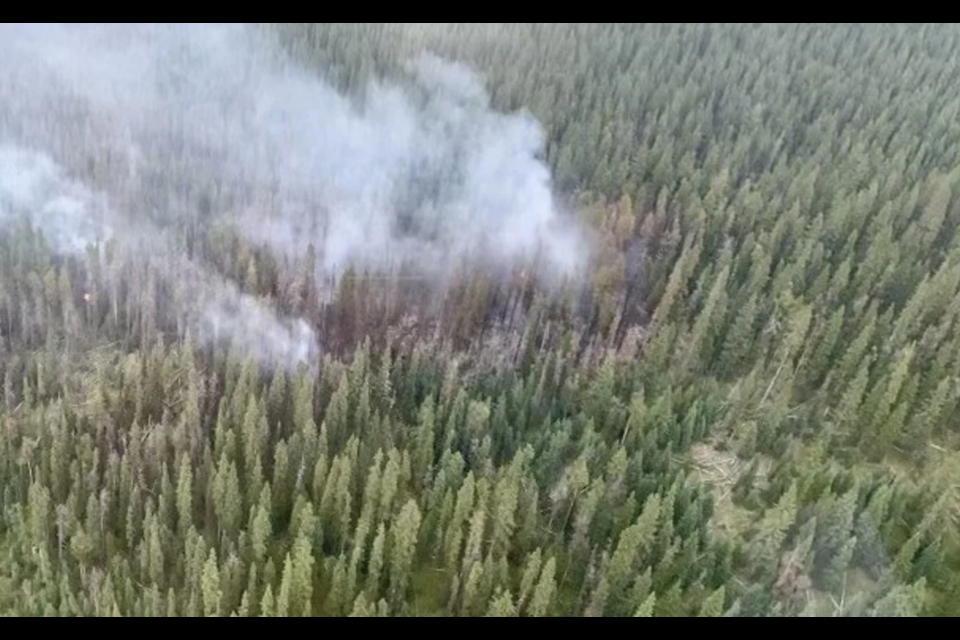MD OF BIGHORN – The MD of Bighorn has declared a state of local emergency in response to a wildfire burning out-of-control about 25 kilometres west of Water Valley.
The declaration follows an evacuation order for anyone in the north Ranchlands area in the MD, north of Highway 579 and south of Highway 734. A map of the evacuation area has been provided by the municipality and road closures are in effect for Highway 579, Highway 40, Burnt Timber Road, and Stud Creek Road.
The fire is about 73 hectares in size, which is smaller than what wildfire officials estimated yesterday night under cover of darkness and smoke.
"We do have a slightly more accurate estimate at 73 hectares now," said Anastasia Drummond, Alberta Wildfire Calgary Forest Area public information officer.
"That's not to say that the size diminished by any means. It's just yesterday there was quite low visibility while crews were working on this fire."
MD of Bighorn communications coordinator Thomas Judek said the state of local emergency was enacted as a proactive measure. It was instated around 4 p.m.
"We declared it in case we need to start evacuating more people or to send out an Alberta Emergency Alert," he said. "By having the state of local emergency in place, it allows us to do that quicker."
The evacuation is for residents and visitors, but Judek said the location of the fire is mostly affecting recreationalists at this time. No threat to infrastructure or structural damage has been reported.
Nearby facilities include Camp Kindle and Fallen Timber South Campground.
"While there is no imminent threat to any structures, the MD is taking this proactive step to ensure efficient management of this emergency," states a Voyent Alert issued by the MD of Bighorn. "Please stay updated via the MD website and social media platforms on this evolving situation."
A reception centre has been set up at the Water Valley Community Hall for evacuees and is open from 8 a.m. to 11 p.m.
Anyone that may still require evacuation assistance is asked to call 403-899-9666. For livestock assistance, call 403-493-4821.
Currently, 22 wildland firefighters are deployed to assist Bighorn Emergency Services fire personnel in putting out the fire.
A helicopter and air tankers have also been bucketing water onto the flames, with air tankers scooping water from Ghost Lake.
The MD is requesting recreationalists stay off the lake while crews are using it for fire suppression.
The wildfire started Monday (July 22) and was caused by lightning.
Drummond noted the wildfire is not currently impacted by weather conditions associated with a tornado watch issued nearby for central Alberta, between Airdrie and Westaskiwin, though, it is still concerning.
"That kind of weather warning is of concern because the winds that can be associated with it are not just strong, but they're very erratic and so it's hard to predict what it would do on the fire other than increase the fire behaviour," she said.
Updates on the wildfire can be found on the Alberta Wildfire website at: https://www.arcgis.com/apps/dashboards/3ffcc2d0ef3e4e0999b0cf8b636defa3.
Fire danger in the Calgary Forest Area, which includes the MD of Bighorn, Canmore, Kananaskis Country and Îyârhe (Stoney) Nakoda First Nation, is currently rated as extreme.
There are currently 173 active wildfires in the province, not including carryovers or mutual aid. Of those wildfires, 56 are listed as out of control, 50 are being held and 67 are under control.
The Calgary Forest Area has recorded 60 wildfires in 2024, totalling 85.67 hectares burned.
At 3:30 p.m., the Alberta government announced it is requesting assistance from the federal government to ensure the province has the fire suppression resources required to address fires burning across Alberta, including wildfires burning in Jasper National Park and threatening the Jasper townsite.
The Local Journalism Initiative is funded by the Government of Canada. The position covers Îyârhe (Stoney) Nakoda First Nation and Kananaskis Country.


